With costs coming down, and the climate and cost savings benefits undeniable, there has never been a better time to invest in a heat pump water heater. Here is everything you need to know about heat pump water heaters, plus our top picks.
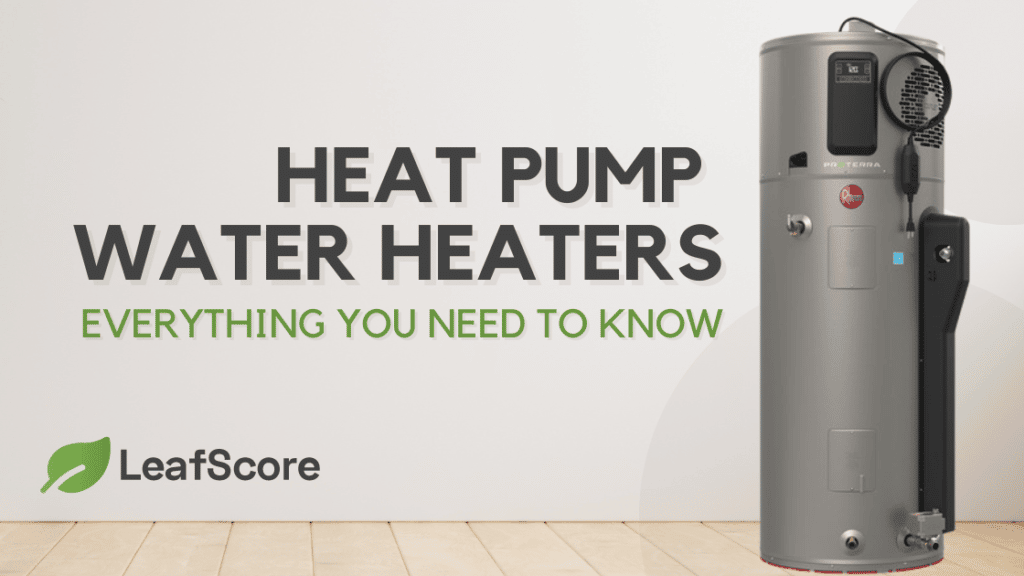
Table of Contents
Heat pumps might seem new to some homeowners, but they have been around for decades and are a proven, reliable technology with a whole host of benefits. Why don’t we all have heat pump water heaters, then?
The main reason is that the cost has been prohibitively high for many homeowners. Thankfully, the technology is now a lot cheaper and easily rivals most standard water heaters (with cost savings throughout their life too!). Another stumbling block is that fossil fuels are just so familiar and understandable that it’s hard to switch your mindset and try something new and, for many, a bit hard to understand.
We offer our top picks for heat pump water heaters for 2023 below. First, though, let’s take a look at how heat pump water heaters work. Check out the FAQs about heat pump water heaters at the end of the article to learn how to choose a system that will work for your family.
How does a heat pump water heater work?
A heat pump water heater is a bit like a refrigerator, just in reverse. Instead of generating heat directly, a heat pump uses electricity to move heat from one place to another. In this case, from the air outside the water tank to the water in the tank, using a compressor, an expansion valve, and evaporator or condenser coils.
The process looks a little like this:
- A fan at the top of the heat pump hot water tank pulls air in from the surrounding space
- The air goes through an evaporator which contains refrigerant
- The refrigerant absorbs heat from the air
- The refrigerant runs through a compressor, which increases the temperature and pressure
- The heated refrigerant passes through a condenser coil around the tank transferring heat to the water.
Conventional hot water heaters use gas combustion to heat water or use heat generated through electrical resistance. These are both far less efficient than simply moving existing heat to where you need it.
Because heat pump water heaters work in a similar way to refrigerators, they also use refrigerant or coolant to move heat around. Some coolants are potent greenhouse gases themselves, while others are less harmful. Our top picks for heat pump water heaters tend to use a lower-impact R-744 refrigerant.
Types of heat pump water heaters
Most heat pump water heaters are hybrid systems that can switch modes to operate like a standard electric water heater when needed. This type of system balances energy efficiency and performance, allowing for a fast boost of power if you need a lot of hot water fast.
Another type of system, the split system, works like a home heating heat pump. It has a small unit outside the house that is linked to a hot water tank inside (like the Sanco systems below). This type of model doesn’t usually have an electric resistance heating element, whereas hybrid systems do. Split systems are a great fit (literally) for smaller spaces as hybrid heat pump water heaters are typically bigger than conventional water heaters.
Benefits
Heat pump water heaters are super energy efficient and offer a raft of benefits, including:
Cheaper utility bills – Heat pump water heaters use 70% less electricity to make the same amount of hot water as standard water heaters. This means they save you around a third of the cost of most conventional electric water heaters. For most households, a hybrid heat pump water heater will save around $1000 over three years, meaning a very short payback period.
Free eBook: Simple Steps to a Greener Home
Concerned about climate change? Learn actionable tips for making each room in your home greener.
"*" indicates required fields

Increased flexibility – heat pump water heaters give you more control and flexibility over performance. They allow you to track and monitor energy usage and participate in some energy-saving incentive programs (where available). Smart water heaters also let you set your heater to vacation mode if you’re away.
Bonus dehumidification and cooling – depending on the type of heater and where it draws in air, a heat pump water heater can cool and dehumidify the air around it, reducing your need for air conditioning. This makes heat pump water heaters a great choice for clammy basements and stuffy garages. You can also vent the cool, dry air outside or into another room if you prefer.
Greater safety – Because they don’t burn fossil fuels (directly), heat pump water heaters are safer, easier, and sometimes cheaper to install, requiring no extra venting to remove exhaust gases.
Greater reliability – heat pump water heaters use reliable, proven technology to heat water consistently. They don’t rely on the direct burning of fossil fuels, so won’t face issues such as gas leaks and tend to need less servicing and much less frequent replacement than conventional water heaters. (Note, too, that ENERGY STAR® certified electric water heaters come with a minimum 6-year manufacturer warranty.)
Saving money and carbon emissions
Because Heat pump water heaters require less energy to make the same hot water, this helps to reduce electricity (or gas) consumption, which cuts greenhouse gas emissions.
On average, a standard electric storage tank water heater costs $436 to run each year. In contrast, an Energy Star-certified heat pump water heater costs just $122, meaning a $314 saving annually.
Conventional electric water heaters typically cost around $500. A hybrid heat pump water heater may cost $1500 or more. With around $300 in utility bill savings each year, the heat pump water heater payback period is just three years, without factoring in rebates. Factor in the government incentive and some state and local incentives and you may pay off the difference in less than a year, after which you keep saving money for years to come.
Heat pump water heaters are also low-cost to maintain. They require an occasional visual inspection, annual flushing, and a check of the anode rod, just like standard electrical tanks. A filter alarm should be included with the unit, to let you know when to clean the filter.
Where to put your heat pump water heater
A heat pump water heater is usually a bit bigger than a conventional water heater. This means you’ll need a larger space than you currently have for your water heater. However, if you opt for a split system, your setup may actually be smaller. And, if you’re switching out an old gas furnace for a heat pump too, the overall footprint inside your home should be smaller.
Because they draw in air to create heat, a heat pump water heater needs good clearance around the unit. Most models need 750 to 1000 cubic feet of air for optimal performance. This is the equivalent of the air inside a room measuring 10 feet by 10 feet. If you have no choice but to place your unit inside a closet, use a louvered door or jumper duct to ensure air intake, or follow the manufacturer’s instructions.
It’s best to avoid putting heat pump water heaters in conditioned or finished spaces. If you only have finished spaces available indoors, try to avoid placing your heat pump water heater near a thermostat. Otherwise, the cool, dry air it expels can cause your heating system to activate more often than strictly necessary. If you have a wine cellar or similar storage pantry, this may be ideal for a heat pump water heater. Unfinished basements are also excellent, especially if you can place the unit near a furnace.
Heat pump water heaters also need to drain to an existing drain or condensate pump. This is because they produce pure, clean, non-corrosive condensate water (remember, they dehumidify the air around them).
Top picks
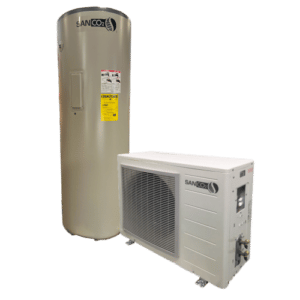
Eco2 Systems 83-Gallon SANCO2 Heat Pump Water Heater
The 83-gallon SANCO2 is a super efficient split-system heat pump water heater that uses natural refrigerant. Ideal for households of five or more.
The 83-gallon SANCO2 has a UEF of 3.75, a diameter of 24.5-inches, and measures 68.875-inches tall. This model has a first hour delivery of 115 gallons and is suitable for households of five or more.
As with the smaller and larger systems, you can buy the two components of this system individually. Should anything go wrong with either, this makes for easier repair and replacement.
Why we like SANCO2
SANCO was the first company to introduce a CO2-refrigerant heat pump water heater for residential use in North America. The two-piece system involves an outdoor unit where the water is heated and an indoor water storage tank. Installation is simple, requiring basic plumbing connections to connect the storage tank and heat pump.
The high-efficiency heat pump water heaters are suitable for colder climates and have a higher uniform first-hour rating (UFHR) compared to any other water heater.
At their peak, the SANCO units use 80% less energy than equivalent electric resistance water heaters and 40% over other hybrid heat pump water heaters.
The units run on electricity and use carbon dioxide as a natural refrigerant, meaning no concerns over carbon monoxide emissions and a much smaller greenhouse gas footprint overall. The CO2 refrigerant also allows the unit to make and store hotter water than other heaters using standard refrigerants.
SANCO heat pump water heaters get great UEF scores in the lab and great scores in real-life. This is because they boast an inverter-compressor that varies the compressor speed to increase efficiency and save energy.
The units have an inverter-compressor, fan motor, and water pump which run on direct current (DC). This also increases energy efficiency as it means there’s no loss of energy when converting to alternating current (AC). This also allows the motor and pump to run at speeds based on load requirement, again offering energy efficiency optimization. And, for anyone thinking about installing solar panels or who already has a DC circuit set up that connects to their solar array, this heat pump water heater is ideal because it uses less than 2,000 Watts maximum.
The SANCO2 Heat Pump Water Heaters (43-gallon and 83-gallon) come with a 10-year parts warranty, a 3-year labor warranty, and a 15-year lifetime warranty on the tanks. These appear to be the longest, most comprehensive warranties for heat pump water heaters. These models were formerly known as SANDEN Heat Pump Water Heater Units.
The downsides to the SANCO models are a lack of smart connectivity and ability to control how the unit operates. There’s no Demand Response capability, unlike with Rheem, and no vacation mode as is standard with A.O. Smith and Rheem models.
That said, SANCO offers a great warranty, incredible efficiency overall, higher first-hour delivery, and the knowledge that your heat pump is operating using a natural refrigerant with low global warming potential.
Free eBook: Simple Steps to a Greener Home
Concerned about climate change? Learn actionable tips for making each room in your home greener.
"*" indicates required fields

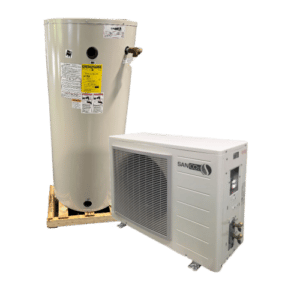
Eco2 Systems 119-Gallon SANCO2 Heat Pump Water Heater
A great choice for households of 5 or more, or when sharing a hot water tank with a rental suite or other family, the 119-gallon SANCO2 has a UEF of 3.4 and uses an eco-friendly natural refrigerant.
If you’re sharing your hot water tank with another large household or rental suite, the 119-gallon SANCO2 is a great choice for a heat pump water heater. The 119-gallon model has a UEF of 3.4, a diameter of 28-inches, and measures 63.6-inches tall.
As with the 43- and 83-gallon systems, this larger heat pump water heater is a split-system and not a hybrid heater. That makes it a really good option if you’re worried about having enough hot water on hand to meet periods of high demand. With no electrical resistance backup heating elements, this larger unit offers peace of mind that you’ll always have more than enough hot water.
Note that the 119-gallon model comes with the same excellent warranties as its smaller counterparts, albeit with a 10-year tank warranty instead of a 15-year warranty.
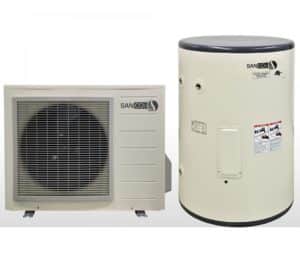
Eco2 Systems 43-Gallon SANCO2 Heat Pump Water Heater
$5406
The 43-gallon SANCO2 is a great choice for smaller households of two to four people and is ideal for shorter spaces. It has a UEF of 3.1 and uses natural refrigerant with low global warming potential.
The 43-gallon SANCO2 has a UEF of 3.1, a diameter of 24.5-inches, and measures 38.125-inches tall, making it a good choice for smaller, especially shorter, spaces. This model offers 69 gallons of hot water in the first hour and is suitable for households of two to four people.
You can also buy the two components of this system separately, which makes for easy and cheaper replacements down the line.
Notes on the new SANCO model
The heat pump operates within a temperature range of -25°F to 104°F ambient temperature. The company recently introduced a new version of the heat pump for this system to overcome an issue where condensate freezing had the potential to affect the rotation of the fan and pump.
The new model is the GS4-45HPC-D and is known as the ‘low ambient’ model of the heat pump. This version is best suited to more northerly locations as it has the same performance, almost the same efficiency, and includes a 132-Watt heater that activates at temperatures below 34 degrees Fahrenheit to prevent freezing of the condensate. Unfortunately, the older systems can’t be retrofitted with the new heater component as the wiring is incompatible. If you live in a colder location, then, make sure you install the newer model (view here), which only costs $75 more than the old model.
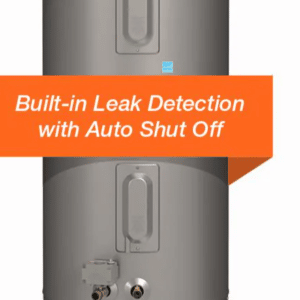
Rheem ProTerra 40 Gallon 10-Year Hybrid High Efficiency Smart Tank Electric Water Heater with Leak Detection & Auto Shutoff
Highlights: A great choice for households of two to four people, this 40-gallon smart hybrid system has a 3.75 UEF rating and is Northwest Energy Efficiency Alliance (NEEA) Tier 4 qualified with a CCE of 3.1. Can be monitored and controlled remotely and is Demand Response Ready for extra savings!
$1915.90
Rheem’s ProTerra 40-gallon Smart heat pump water heater is a great choice for households of two to four people. It has a 3.75 UEF rating and is Northwest Energy Efficiency Alliance (NEEA) Tier 4 qualified with a CCE of 3.1.
Overall, this heat pump water heater is expected to reduce energy consumption by around 75%, making a huge difference to a household’s carbon footprint while saving around $315 in energy costs each year.
The 40-gallon model measures 63-inches tall and has a diameter of 20.25-inches.
Rheem’s ProTerra models differ from its Performance line because they have built-in LeakGuard. This is an integrated 360° leak detection system that works with an auto-shutoff valve to protect against possible water damage. If it detects a leak, the system shuts off incoming water and locks water in the tank.
Rheem’s ProTerra range also has in-built WiFi and works with the company’s EcoNet app. This allows you to check hot water availability, monitor energy use, and control the mode of operation all from your smartphone. You can switch between four modes to balance or prioritize efficiency and performance. Modes include a High Demand Mode and a Vacation Mode.
Rheem ProTerra heat pump water heaters are Demand Response ready, which means you can connect to the electrical grid to participate in energy-saving programs without any extra cost. In fact, by being able to schedule water heating to take place at off-peak, low-demand times, this model saves you money and could qualify for additional rebates and ongoing incentives.
These models have an easily accessible electrical junction box and can be dropped in for easy replacement of most standard electric water heaters. The ProTerra is also ductable, so you can route colder exhaust air out of your home or into an adjacent room or attic space. There’s a premium brass drain valve to make draining easy and stainless steel elements help prevent the build-up of grime and dust.
The hybrid heat pump water heaters come with a 10-year warranty and 1-year in-home labor warranty.
Free eBook: Simple Steps to a Greener Home
Concerned about climate change? Learn actionable tips for making each room in your home greener.
"*" indicates required fields

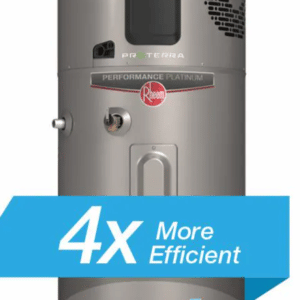
Rheem ProTerra 50 Gallon 10-Year Hybrid High Efficiency Smart Tank Electric Water Heater with Leak Detection & Auto Shutoff
Highlights: A great choice for households of 2-3 people – requires less energy to operate than a 100 Watt incandescent light bulb!
$1936.42
Compared to a standard electric water heater, the Rheem ProTerra 50-gallon model could save you around $315 per year in energy costs. It has a UEF of 3.75 and a CCE of 3.2, qualifying for Northwest Energy Efficiency Alliance (NEEA) Tier 4 (meaning it’s a great choice in colder climates).
The A.O. Smith 50-gallon Voltex model is a bit more efficient than the Rheem 50-gallon model, however, and has much of the same functionality while being a little taller and a tad narrower.
The 50-gallon Rheem ProTerra heat pump water heater measures 62 inches tall and has a diameter of 22.25 inches.
Why we like Rheem
Rheem is another big name in heat pump water heaters. This global company also sells water heating products under brand names including Ruud and Richmond.
Rheem is a little more progressive than A.O. Smith when it comes to sustainability initiatives and product innovation. This is evident in some of the technology in its latest ProTerra line of heat pump water heaters (see below). Rheem also publishes an annual sustainability report which details practices such as switching 95% of lighting to LED across its operations, increased use of recycled cardboard packaging, reducing overall packaging, and significantly reducing water use in its factories.
Rheem has established a goal of reducing company greenhouse gas emissions by 50% by 2025. It also aims to achieve zero waste to landfill in its global manufacturing operations by this date. So far, four of its factories have achieved Zero Waste to Landfill status with one site reaching a 100% diversion rate.
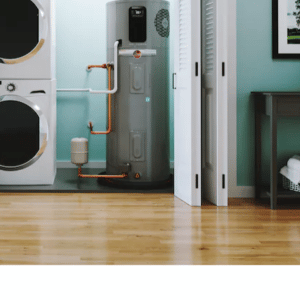
Rheem ProTerra 80 Gallon 10-Year Hybrid High Efficiency Smart Tank Electric Water Heater with Leak Detection & Auto Shutoff
$2388.79
Highlights: A smart heat pump water heater with a 3.85 UEF rating and 3.2 CCE. A great choice for households of 2-3 with higher hot water demand.
The Rheem ProTerra 65-gallon smart heat pump water heater has a 3.85 UEF rating and 3.2 CCE, qualifying for Northwest Energy Efficiency Alliance (NEEA) Tier 4. It’s a great choice for households of 2-3 with higher hot water demand, though the A.O. Smith 66-gallon Voltex model is more energy efficient overall.
This model could save you around $269 each year, compared to standard electric water heaters. It measures 65-inches tall and 24.25-inches in diameter.
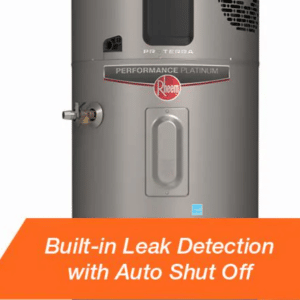
Rheem ProTerra 80 Gallon 10-Year Hybrid High Efficiency Smart Tank Electric Water Heater with Leak Detection & Auto Shutoff
Highlights: An 80-gallon smart hybrid heat pump water heater with a higher UEF than any other model (4.0). Suitable for colder climates, with easy connectivity, monitoring, remote control, and Alexa-enabled!
$2841.14
Rheem (and Ruud) are an especially good choice for 80-gallon heat pump water heaters, offering a higher UEF than any other brands. This 80-gallon model can save households around $490 in annual energy savings, quickly paying for itself (even without rebates and tax incentives).
Rheem’s 80-gallon ProTerra hybrid heat pump water heater also boasts a higher UEF than any other model (4.0) and is Northwest Energy Efficiency Alliance (NEEA) Tier 4 qualified with a CCE of 3.2.
This larger water heater measures 75 inches tall and has a diameter of 24.25 inches. It has all the bells and whistles of the smaller units, including a glass-lined tank, overheat protection, temperature pressure relief valve, vacation mode, and WiFi built in, and even works with Alexa!
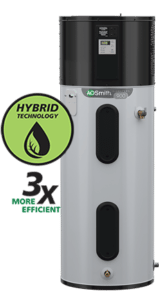
A.O. Smith 80 Gallon Tall 10-Year Hybrid High-Efficiency Electric Heat Pump Water Heater
Highlight: Energy Star certified super-efficient water heater ideal for families of five or more or where hot water is shared between suites. Can provide enough hot water for seven showers back-to-back and reduces water heating costs by up to 72%!
Model: HP10-80H45DV
The A.O. Smith 80-gallon Voltex™ hybrid heat pump water heater is a top choice for a large family or where you’re sharing your water heater with a second or even third suite. This larger model can provide enough hot water for a 55-minute shower, at least four showers simultaneously, or seven showers back-to-back!
The estimated energy cost for this water heater is just $152 a year, making for huge savings when switching from electric or gas heating. It is Energy Star certified and reduces the cost of heating water by up to 72%.
This model has a UEF of 3.88 and a CCE of 3.4, with Northwest Energy Efficiency Alliance (NEEA) Tier 4 qualification. This means it is one of the best choices for a heat pump water heater in northerly, colder climates.
With estimated savings of $4,500 in water heating costs over 10 years, this model could pay for itself in savings in 2-3 years even without rebates and tax credits. In 2023, this model could net homeowners a tax credit of up to $2,000 (the credit is just $300 for 2022, though).
The 80-gallon water heater features two back-up, 4,500-Watt copper heating elements, so when demand is high, the hybrid heater falls back on standard electrical resistance to heat water quickly. This allows the unit to provide a staggering 82 gallons of hot water in an hour.
Despite its large capacity and capability, this heater is slim and easy to install. It measures 69-inches high and 27-inches in diameter, allowing it to be tucked away in a corner (assuming good ventilation).
The Voltex heater offers four modes – efficiency, hybrid, electric, and vacation – to maximize efficiency and performance. It also boasts an easy-access washable filter for simple maintenance and Tank Guard™ to prevent corrosion. This model also comes with a 10-year limited residential warranty and a good guarantee that the longstanding company will be around to honor that warranty if necessary.
If you prefer to buy State, check out the State Premier® AL Smart Hybrid Electric Heat Pump 80-Gallon Water Heater, model HPSX-80-DHPT (view here).
Why we like A.O. Smith heat pump water heaters
A.O. Smith has been in the business of heating water for more than 80 years. The global business is based in Ashland City, Tennessee, where it operates the world’s largest water heater factory. The company also manufactures products in four other North American locations as well as in China and the Netherlands.
A.O. Smith’s Voltex® Hybrid Electric Heat Pump Water Heater has been around for more than a decade and earned the 2010 Green Product Award by Building Products magazine. The hybrid electric heat pump tank water heater is available in three sizes – 50, 66, and 80 gallons – and is a tried and tested smart water heater with a variety of helpful functions.
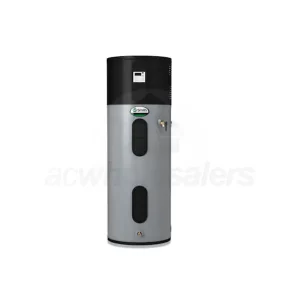
A.O. Smith 66 Gallon Voltex® AL Smart Hybrid Electric Heat Pump Water Heater with Anti-Leak Technology
Highlight: Smart hybrid heat pump water heater that offers enough hot water for up to a 51-minute shower, 6.5 showers back-to-back, or 4.4 simultaneous showers! Great choice for colder climates, this model is Energy Star certified and has a CCE of 3.5, a very impressive 4.02 UEF, and a LEED rating of 2.
Model HPTS-66
Like its smaller and larger counterparts, the A.O. Smith 66-gallon Voltex hybrid heat pump water heater can save buckets of cash over its lifetime. This newer model also boasts anti-leak features for extra reassurance, and smart connectivity through iCOMM™, where you can receive alerts and notifications through the fee A.O. Smith app on your phone.
The water heater has an easy-to-use display where you can choose between four modes for energy efficiency and performance. You can also change the mode of operation remotely and monitor performance, so you always know how much hot water you have on hand!
A smart anode analyses local water conditions and modulates operations to extend the life of the heater. There are two back-up heating elements to help during periods of high demand.
The Voltex AL 66-gallon model is also Northwest Energy Efficiency Alliance (NEEA) Tier 4 qualified with a CCE of 3.5, which means it is a great choice for homes in more northerly, colder climates. It has a very impressive 4.02 UEF and is Energy Star certified and has a LEED rating of 2.
The anti-leak (AL) smart sensor can tell if there’s a leak and alerts you right away. It is also compatible with an accessory automatic water shutoff valve, so you can prevent or minimize damage should a leak occur.
This model is also super easy to install, with a flexible design allowing for top and front water connections. You don’t need to factor in clearance on the sides or back either, and because the ducting adapters are integrated, this model is a breeze for tight spaces.
This 66-gallon model offers enough hot water for up to a 51-minute shower, 6.5 showers back-to-back, or 4.4 simultaneous showers.
Note: If you prefer to buy the American brand version of this unit, check out the HPS10266H045DV – ProLine® XE 66 Gallon AL Smart Hybrid Electric Heat Pump Water Heater with Anti-Leak Technology (view here). Similarly, if you’re keen on the State brand, check out the State Premier® HPSX-66-DHPT AL Smart Hybrid Heat Pump Water Heater (view here.
Is A.O. Smith the same as State and American?
A.O. Smith is also a name that will pop up when you’re looking at heat pump water heaters from State. The State brand was acquired by A.O. Smith in 2001 and carries all the same features and technology, with the same three sizes of water heater available (50-, 66-, and 80-gallon) in its Premier AL Smart line.
A.O. Smith also took over the American Water Heater brand in 2005 by way of its acquisition of GSW Inc., a Canadian manufacturer. For its part, American Water Heater was bought by GSW in 2002 and sells water heaters under the names American PROLine and U.S. Craftmaster.
Basically, if you’re looking for a heat pump water heater, A.O. Smith has cornered the market. And, while I’m not usually a fan of monopolies, the good news is that the larger company knows its heat pump technology and makes quality products backed by a solid warranty and excellent service.
The acquisitions by A.O. Smith also allow the company to sell through Lowes, making heat pump water heater technology more accessible to more people across North America. That said, the major downside to A.O. Smith currently is that these units are typically only available to purchase through an installer. With Rheem and some other brands, customers can purchase the units directly.
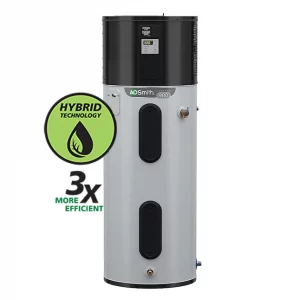
A.O. Smith 50-gallon Voltex® AL Smart Hybrid Electric Heat Pump Water Heater with Anti-Leak Technology
Northwest Energy Efficiency Alliance (NEEA) Tier 4 qualified with a CCE of 3.4, Energy Star certified, and has a UEF of 3.8. This 50-gallon model can provide enough hot water for a 34-minute single shower, 4.3 showers back-to-back, or 3.7 simultaneous showers!
Model HPTS-50
Ideal for families of 2-3, the Voltex® AL 50-gallon Smart Hybrid Heat Pump Water Heater can provide enough hot water for a 34-minute single shower, 4.3 showers back-to-back, or 3.7 simultaneous showers. There are also two back-up, 4,500 Watt electric heating elements to help meet high demand.
This smart model has anti-leak technology which is compatible with an accessory automatic shut-off valve. A smart anode adapts operations to meet local water conditions, helping to protect and extend the life of the water heater.
The Voltex Al 50-gallon model also features iCOMM™ Smart Connectivity, so you can monitor and control the unit remotely and get alerts to any issues to help prevent and minimize potential flooding and property damage. You can choose between four operation modes, including vacation mode to save energy and money while away.
The Voltex® AL is Northwest Energy Efficiency Alliance (NEEA) Tier 4 qualified with a CCE of 3.4. It is also Energy Star certified, and has a UEF of 3.8.
As with the two larger models, the 50-gallon water heater has top and front water connections to make installation simpler. It doesn’t require clearance on the sides or back and has integrated ducting for convenience in tight spaces. This model is 63-inches tall and has a diameter of 22-inches.
For the State version of this model, check out the State Premier® Al Smart Hybrid Electric Heat Pump 50-Gallon Water Heater, model HPSX-50-DHPT (view here).
Free eBook: Simple Steps to a Greener Home
Concerned about climate change? Learn actionable tips for making each room in your home greener.
"*" indicates required fields

Summary
40-50-gallon heat pump water heaters
A 40-gallon water heater is a great choice for most households of up to two people. For households of two to three, a 50-gallon water heater typically covers all your needs. In this range, most water heaters struggle to reach a UEF higher than 3.8, with A.O. Smith and State the most efficient in general and in colder climates.
| Product Brand | Model | Volume (gallons) | Maximum Recommended Household Size | Cool Climate Efficiency (CCE)† | Uniform Energy Factor (UEF) |
| A.O. Smith | HPTS-50 2** | 50 | 2-3 | 3.4 | 3.80 |
| A.O. Smith | HPS10-50H45DV 2** | 50 | 2-3 | 3.4 | 3.80 |
| Ruud | HPLD40-1RU | 40 | 2 | 3.1 | 3.75 |
| Richmond | 10E40-HP530 | 40 | 2 | 3.1 | 3.75 |
| Rheem | HPLD40-1RH (Commercial) | 40 | 2 | 3.1 | 3.75 |
| Rheem | HPLD50-1RH | 50 | 2-3 | 3.2 | 3.75 |
| Rheem Canada | CXE40T10H45UO | 40 | 2 | 3.1 | 3.75 |
| State | HPSX-50 DHPT 2** | 50 | 2-3 | 3.4 | 3.80 |
| SANCO | GS4-45HPC + SAN-43SSAQA | 43 | 2-4 | n/a | 3.1 |
** For models listed with an asterisk, any number is allowed to substitute for the *. For example, *** could be 120 or 130.
60-70-gallon heat pump water heaters
Mid-sized heat pump water heaters offer 60 to 70 gallons and are ideal for households of up to three. In this range, most water heaters have a 66-gallon volume and many are super-efficient, with a UEF of over 4!
| Product Brand | Model | Volume (gallons) | Maximum Recommended Household Size | Cool Climate Efficiency (CCE)† | Uniform Energy Factor (UEF) |
| A.O. Smith | HPTS-66 2** | 66 | 3 | 3.5 | 4.02 |
| American | HPS10266H045DV 2** | 66 | 3 | 3.5 | 4.02 |
| Rheem | HPLD65-1RH | 65 | 2-3 | 3.2 | 3.85 |
| State | HPSX-66-DHPT 2** | 66 | 3 | 3.5 | 4.02 |
Large, 80+ gallon heat pump water heaters
For larger families with four or more household occupants, an 80-gallon water heater or bigger is usually necessary. Few models have a UEF higher than 3.88, though Ruud and Rheem offer water heaters with a 4.00 UEF and excellent cool climate efficiency.
Sanco also offers an efficient heat pump water heater in this size range and the company uses a more environmentally friendly refrigerant than its competitors.
| Product Brand | Model | Volume (gallons) | Maximum Recommended Household Size | Cool Climate Efficiency (CCE)† | Uniform Energy Factor (UEF) |
| A.O. Smith | HPTS-80 2** | 80 | 4 | 3.4 | 3.88 |
| A.O. Smith | HPS10-80H45DV 2** | 80 | 4 | 3.4 | 3.88 |
| American | HPS10280H045DV 2** | 80 | 4 | 3.4 | 3.88 |
| Rheem | HPLD80-1RH | 80 | 4 | 3.2 | 4.00 |
| State | HPSX-80-DHPT 2** | 80 | 4 | 3.4 | 3.88 |
| Ruud | HPLD80-1RU | 80 | 4 | 3.2 | 4.00 |
| SANCO | GS4-45HPC+SAN-83SSAQA | 83 | 5+ | n/a | 3.75 |
| SANCO | GS4-45HPC + SAN-119GLBK | 119 | 5+ | n/a | 3.4 |
Final thoughts
Water heaters account for about 20% of energy use in most homes. An Energy Star-certified heat pump water heater is about four times more efficient than standard water heaters, using 70% less electricity to heat the same amount of hot water. This can save most homeowners around $300 each year in electricity costs and help save tons of carbon emissions over the life of the heater.
An ENERGY STAR ® heat pump water heater is a smart investment. Sure, they cost quite a bit more upfront than standard gas or electric heaters, but they attract rebates and tax credits that help offset that initial cost. And, because they’re so energy efficient, heat pump water heaters quickly pay for themselves in energy savings.
If you’re considering a heat pump water heater, check with your utility and local government before choosing a model. Chances are they have a list of approved appliances that can quickly and easily earn you a rebate or tax credit. You may even get an upfront discount on installation if you choose a utility’s preferred contractor to do the job.
All heat pump water heaters require the presence of a refrigerant to transfer heat from the air to the water. Not all refrigerants are created equal, with some carrying much higher global warming potential than others. I’ve written more widely about refrigerants here.
For now, though, suffice it to say that almost all heat pump water heaters sold in the U.S. use R134a refrigerant or R-410a, although the latter is being phased out in the U.S. for lower global warming potential alternatives (like R134a). In contrast, CO2 heat pump water heaters are very popular in Japan, with several manufacturers offering these types of units.
It is incredibly difficult to tell which refrigerant Rheem uses for its heat pump water heaters. I contacted the company for clarification but didn’t get a response before publication. Some Rheem documentation suggests certain models use R-410a, despite this being phased out. Other documents suggest the use of R134a.
A.O. Smith uses R134a refrigerant for its heat pump water heaters. This isn’t as good as CO2 but is better than R-410a.
I expect to see more heat pump water heater manufacturers using carbon dioxide as a refrigerant in years to come. So far, only SANCO models, sold by Eco2 Systems, are available for residential use. Mitsubishi launched a CO2 heat pump water heater in the U.S. in 2021, but this is only for commercial and industrial applications.
Heat pump water heaters generate a small amount of sound. This is usually a low hum, similar to that of a refrigerator or new (quieter) dishwasher. They’re typically a lot quieter than a gas furnace, but if you think the noise may be disturbing, consider a Sanco system where the heat pump component is outside and the water storage tank inside.
To install a heat pump hot water system, you’ll almost certainly need a dedicated 240 Volt outlet. Most homes with a current electrical water heater already have it plugged into such an outlet.
If you have a gas water heater, you might need an electrical panel upgrade. That said, newer heat pumps are being developed that can operate on standard 120 V outlets.
If you need to upgrade your electrical panel to accommodate a heat pump water heater, the federal government offers up to a $4,000 rebate to help. For electrical wiring improvements, you can access up to a $2,500 rebate.
Yes! Homeowners installing a heat pump water heater in their primary residence can access a federal tax credit. Up until December 31st, 2022, the tax credit is $300 for units with a Uniform Energy Factor (UEF) of 2.2 or higher. From January 1, 2023, this tax credit could be worth up to $2,000, depending on your household income and which model you buy.
Many utilities also offer rebates for heat pump water heaters. Duke Energy, for instance, offers a $350 rebate. You can also check the ENERGY STAR Rebate Finder and enter your zip code to see incentives available where you live.
Low- to moderate-income families can also access grants and other incentives to install a heat pump water heater. The Department of Energy offers a Weatherization Assistance Program (WAP), for instance, which includes a home energy assessment and help with energy efficiency upgrades. The Low Income Energy Assistance Program (LIHEAP) also offers help with home repairs and upgrades, and many local electric utilities and states offer support for low-income customers.
Like standard water heaters, heat pump water heaters come in a variety of sizes. Typically, these are in the 40-50 gallon (for 2-3 people), 60-70 gallon (for 3-4 people), and 80+ gallon (for 4+ people) ranges.
It’s best to size your heat pump water heater to meet your current needs and, ideally, any near future increase in needs.
For instance, if you’re upgrading your home water heating system and expect to have family move back home or are planning a renovation and a rental suite that will share the hot water, size up now to save money in the long-run.
The size of your tank should be listed in gallons on the nameplate and on the Energy Guide (yellow) sticker of any new model.
Yes! However, it’s always best to place your water storage tank inside, in a spot that remains above freezing all year round. For ideal performance, the unit should be located inside where the temperature stays within the 40º–90ºF (4.4º–32.2ºC) range. Many models can operate outside this temperature range for short periods of time, but it’s not ideal.
If you live in more northerly states or Canada, consider getting a heat pump water heater that meets the Northern Climate Efficiency Specification developed by the Northwest Energy Efficiency Alliance (NEEA). These units have been tested using protocols with lower temperature ambient air and inlet water. All such units must be ENERGY STAR certified and generally have larger compressors that cut off at lower temperatures to work more efficiently in colder climates.
Thanks for sharing your research and knowledge, Leigh. I still haven’t quite wrapped my head around the fact that the SANCO2 models generally have a lower UEF than the hybrid models – it seems it should be the other way around, given the inverter compressor, etc. Any insights there?
I wonder if you’ve looked at Rheem’s 120V Plug-In models that can be found at: https://www.rheem.com/products/residential/water-heating/heat-pump-water-heaters/. These offer a great alternative for folks that want to switch from gas to electric, assuming they have an interior space that stays warm enough in winter to accommodate a heat-pump-only heater (as opposed to hybrid). Any comments on the plug-ins?
I know of a field study performed on northern climate HPWH installations. If you’re interested, it may be found here: https://slipstreaminc.org/research/heat-pump-water-heaters-cold-climates.
Something else I hope folks will consider in 2023 is the Inflation Reduction Act and how that could help a lot of people make the switch to HPWHs.
Exciting stuff. Thanks again for your article and for helping to get the word out about this awesome technology!
Hi Sam,
Thanks for all this! Yes, Rheem’s 120 V heat pump water heater is an exciting development! I’m actually looking at that model for my home right now! When I wrote this piece originally, Rheem had only just released the model, so I was waiting to hear how folks liked it. Seems good so far, so I’ll update the piece to include it shortly.
The IRA tax credits for home energy upgrades are also fantastic news. My understanding is that while being federally mandated, it’s up to individual states to determine how they’re doled out. This will likely take some time, meaning folks might not know until later 2023 how the rebates and credits actually look for where they live. As such, it’s likely best to hang fire on updating appliances until the rules are out for your state, unless you absolutely need to replace an appliance that’s broken. Chances are that because the federal law is already in place, credits and rebates should be available retroactively to Jan 1, 2023, but bureaucracy and paperwork might be easier in a few months.
Do you have a HPWH? How’s it working out for you?
Leigh
I am getting a HPWH installed today. This is in large part prompted by my motivation to reduce power demand – I’ve been self powering for 10 days after starting operation of a solar generation and storage system, which so far is operating very well compared to expectations.
The HPWH is a 50 gallon AO Smith Voltex. If I can reduce WH draw by 75% of the periodic kw draw, my batteries will not draw down as fast. And I’ll get a lot closer to making my annual demand fit in my annual production. Looking forward to seeing how all this ends up working.
Hi Leigh-
Thanks for the informative article. Have you seen any data on how these units work with a solar preheat on the feed? Currently my homebuilt solar DHW system feeds a propane-fired water heater. The ancient Robertshaw temperature control doesn’t cope well – it expects a cold water feed – so we have to manually turn on the fire if we need a boost. I would not think this is an issue with modern temperature sensors and controls, but I wonder if the efficiency is affected. I’ll do this conversion in any case to get totally away from the propane…and my electricity is in some sense free since the house is off-grid PV powered.
Steven,
We will answer this question with a dedicated blog post. It will be published in the next few weeks.